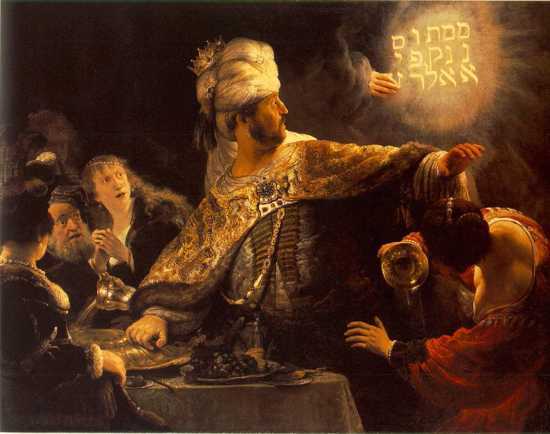+
JMJ
December 20
In our study of Old Testament history, we’ve seen how after the reign of Solomon, the Hebrew people divided into 2 kingdoms. 10 tribes broke away and formed the Kingdom of Israel in the north. Their king, Jeroboam, did not want his people to go to Jerusalem to worship God, so he set up the golden calf idols at Bethel and Dan.
The kingdom of Israel was eventually taken over by the Assyrians and the people were forced to leave their homes. They were dispersed all over the world, becoming the “Lost Tribes of Israel”.
The other kingdom was the Kingdom of Judah. The Kingdom of Judah was made up of 2 tribes; Judah and Benjamin.
The Assyrians tried to take over Judah as well, but as we read yesterday, Judith killed the Assyrian general, Holophernes and for some time they were left in peace.
The Assyrians were busy elsewhere, however. They fought many battles and lost many men. They needed new soldiers to fight their wars, so they forced the people they conquered to fight for them. Naturally, these people were not very eager to fight. Assyria’s power was fading.
In 612 B.C., the Chaldeans took over Assyria, as well as the lands the Assyrians had conquered. The Chaldeans rebuilt the city of Babylon and brought back the Babylonian way of life. For this reason they are sometimes called Babylonians.
In the year 597 B.C. the Chaldeans did succeed in taking over Judah.
They forced many Jews to go to Babylon.
In 586 B.C. the Chaldeans destroyed Jerusalem. Only the poorest Jews were left behind to plant crops.
This was the time of the “Babylonian Captivity.”
Among those who were taken captive was a man named Daniel. Daniel was a prince of the Tribe of Judah; from the kingly line of David.
The Chaldean king, Nebuchadnezzar wanted a few of the best Jews to come and live at his palace so that those Jews might learn the ways of the Chaldeans. He chose Ananias, Misael, Azarias and Daniel.
One night King Nebuchadnezzar had a dream, but he could not remember it very well. Of all the wise men at the king’s court, only Daniel, with God’s grace was able to tell the king what his dream was and what it meant. The dream foretold the rise and fall of the kingdoms of Persia, of Alexander the Great and the Roman Empire, as well as the coming of the eternal kingdom of God; the kingdom of Our Lord Jesus Christ:
“… in the days of those kingdoms, the God of Heaven will set up a kingdom that shall never be destroyed…it shall consume all these kingdoms, and itself shall stand forever.” (Dan 2:44)
Because of Daniel’s wisdom, King Nebuchadnezzar gave Daniel authority and power in Babylon. The other 3 Jewish men; Ananias, Misael and Azarias became governors of the provinces in Babylon. (The Chaldeans changed their names in the process, which makes this part a little confusing.).
Then one day King Nebuchadnezzar made a big idol and told everyone they had to worship it or else. Of course Ananias, Misael and Azarias would not do such a thing, so the king ordered them to be put into a furnace of burning fire.
“But the angel of the Lord went down with Azarias and his companions into the furnace: and he drove the flame of the fire out of the furnace, and he made the midst of the furnace like the blowing of a wind bringing dew…” (Dan3:49-50) And the 3 men sang a canticle to God praising Him for His mercies.
Incidentally, this part of history can be found in the missal for the Mass of Ember Saturday during Advent!
After some time, a new king, King Baltassar reigned in Babylon. This king had a big feast. While he and his guests were eating and drinking from the sacred vessels which had been stolen from the Temple of Jerusalem, a hand appeared and wrote 3 words on the wall; MANE THECEL PHARES
Daniel told the king that:
MANE meant that God would put an end to the king’s kingdom.
THECEL meant “Thou art weighed in the balance and found wanting”
PHARES meant that his kingdom would be divided and given to the Medes and Persians.
That same night, King Baltassar died.
Darius, the Mede, became the next king. (Dan 5) King Darius liked Daniel very much and wanted to put him in charge of his kingdom. This made the other men in power jealous and they looked for a way to get rid of Daniel. Tomorrow we will see what happened next!
Today’s O Antiphon is “O Clavis David”
“O Key of David, and Scepter of the house of Israel, Who openest and no man shutteth; Who shuttest and no man openeth; come and lead the captive from the prisonhouse, him that sitteth in darkness and in the shadow of death.”
It was prophesied that the Saviour would be of the line of King David (hence the “O key of David”). By dying on the cross, Our Lord would reopen the gates of heaven.


Comments
Post a Comment